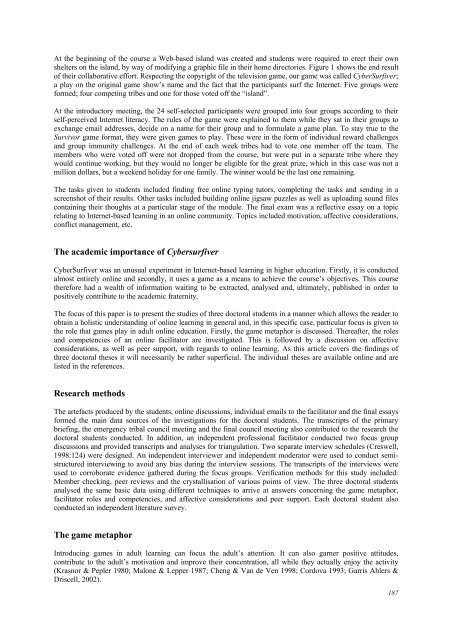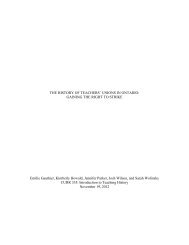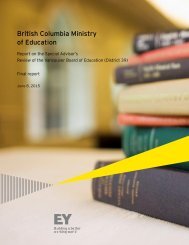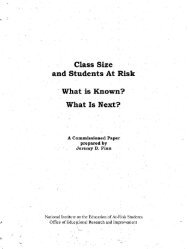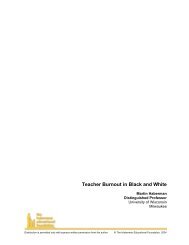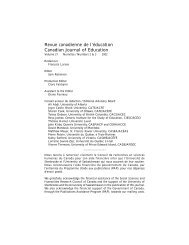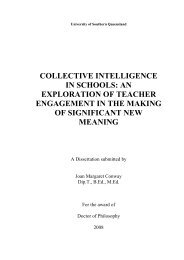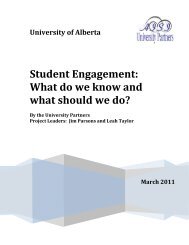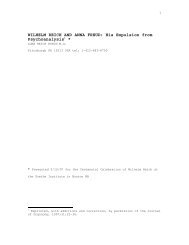October 2006 Volume 9 Number 4
October 2006 Volume 9 Number 4
October 2006 Volume 9 Number 4
You also want an ePaper? Increase the reach of your titles
YUMPU automatically turns print PDFs into web optimized ePapers that Google loves.
At the beginning of the course a Web-based island was created and students were required to erect their own<br />
shelters on the island, by way of modifying a graphic file in their home directories. Figure 1 shows the end result<br />
of their collaborative effort. Respecting the copyright of the television game, our game was called CyberSurfiver;<br />
a play on the original game show’s name and the fact that the participants surf the Internet. Five groups were<br />
formed; four competing tribes and one for those voted off the “island”.<br />
At the introductory meeting, the 24 self-selected participants were grouped into four groups according to their<br />
self-perceived Internet literacy. The rules of the game were explained to them while they sat in their groups to<br />
exchange email addresses, decide on a name for their group and to formulate a game plan. To stay true to the<br />
Survivor game format, they were given games to play. These were in the form of individual reward challenges<br />
and group immunity challenges. At the end of each week tribes had to vote one member off the team. The<br />
members who were voted off were not dropped from the course, but were put in a separate tribe where they<br />
would continue working, but they would no longer be eligible for the great prize, which in this case was not a<br />
million dollars, but a weekend holiday for one family. The winner would be the last one remaining.<br />
The tasks given to students included finding free online typing tutors, completing the tasks and sending in a<br />
screenshot of their results. Other tasks included building online jigsaw puzzles as well as uploading sound files<br />
containing their thoughts at a particular stage of the module. The final exam was a reflective essay on a topic<br />
relating to Internet-based learning in an online community. Topics included motivation, affective considerations,<br />
conflict management, etc.<br />
The academic importance of Cybersurfiver<br />
CyberSurfiver was an unusual experiment in Internet-based learning in higher education. Firstly, it is conducted<br />
almost entirely online and secondly, it uses a game as a means to achieve the course’s objectives. This course<br />
therefore had a wealth of information waiting to be extracted, analysed and, ultimately, published in order to<br />
positively contribute to the academic fraternity.<br />
The focus of this paper is to present the studies of three doctoral students in a manner which allows the reader to<br />
obtain a holistic understanding of online learning in general and, in this specific case, particular focus is given to<br />
the role that games play in adult online education. Firstly, the game metaphor is discussed. Thereafter, the roles<br />
and competencies of an online facilitator are investigated. This is followed by a discussion on affective<br />
considerations, as well as peer support, with regards to online learning. As this article covers the findings of<br />
three doctoral theses it will necessarily be rather superficial. The individual theses are available online and are<br />
listed in the references.<br />
Research methods<br />
The artefacts produced by the students, online discussions, individual emails to the facilitator and the final essays<br />
formed the main data sources of the investigations for the doctoral students. The transcripts of the primary<br />
briefing, the emergency tribal council meeting and the final council meeting also contributed to the research the<br />
doctoral students conducted. In addition, an independent professional facilitator conducted two focus group<br />
discussions and provided transcripts and analyses for triangulation. Two separate interview schedules (Creswell,<br />
1998:124) were designed. An independent interviewer and independent moderator were used to conduct semistructured<br />
interviewing to avoid any bias during the interview sessions. The transcripts of the interviews were<br />
used to corroborate evidence gathered during the focus groups. Verification methods for this study included:<br />
Member checking, peer reviews and the crystallisation of various points of view. The three doctoral students<br />
analysed the same basic data using different techniques to arrive at answers concerning the game metaphor,<br />
facilitator roles and competencies, and affective considerations and peer support. Each doctoral student also<br />
conducted an independent literature survey.<br />
The game metaphor<br />
Introducing games in adult learning can focus the adult’s attention. It can also garner positive attitudes,<br />
contribute to the adult’s motivation and improve their concentration, all while they actually enjoy the activity<br />
(Krasnor & Pepler 1980; Malone & Lepper 1987; Cheng & Van de Ven 1998; Cordova 1993; Garris Ahlers &<br />
Driscell, 2002).<br />
187


